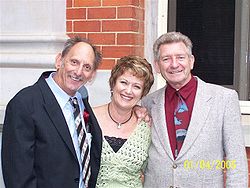
Broken Lives
Encyclopedia
Broken Lives was written by Estelle Blackburn
between 1992 and 1998. The book is about the false imprisonment
of two people, John Button
and Darryl Beamish
who were both convicted for murders that were later proved to be committed by Eric Cooke
.
Though the information was to go into a book it became a combined exercise in authorship and citizen advocacy which led to the re-opening of the cases of both Button and Darryl Beamish
and the quashing of their long-standing convictions.
was convicted of the manslaughter
of his girlfriend, Rosemary Anderson. Button was originally charged with wilful murder but the jury found him guilty of the lesser charge and was sentenced to 10 years jail. Button's brother approached Blackburn in January 1992 claiming his older brother had been framed for a murder committed by Eric Cooke
, though skeptical Blackburn met John Button in February 1992. After hearing his testimony and reading the appeal books kept from his previous court actions, decided that his case would be an appropriate topic for the book.
The key discovery in the revision of the case histories was that Eric Cooke had been a multiple-method killer. His offences show a significant deviation from the pattern generally accepted as the orthodox "serial killer
" template, which holds that such killers target the same type of victim in the same way, impelled by the same underlying motive. Cooke, conversely, for differing reasons, using various methods, killed or attempted to kill persons of both sexes and of a wide spread of ages and social circumstances.
 Blackburn discovered, once granted access to police archives, that the police had not emphasised this behaviour pattern of Cooke in their public statements. The Western Australian community at large and the legal advocates for Button and Beamish were unaware that Cooke had attempted murder of several people by vehicle impact. This was the means by which John Button's girlfriend, 17-year old Rosemary Anderson, had been killed. At the time of Button's trial for her wilful murder, her death appeared to be an isolated event and his claim that he had coincidentally discovered her after the attack seemed implausible. Likewise, during Darryl Beamish's trial for the wilful murder of 22-year-old heiress Jillian Brewer (who was attacked while she slept), the offence was not placed in the context of the series of assaults that Cooke had committed against other women asleep in their homes.
Blackburn discovered, once granted access to police archives, that the police had not emphasised this behaviour pattern of Cooke in their public statements. The Western Australian community at large and the legal advocates for Button and Beamish were unaware that Cooke had attempted murder of several people by vehicle impact. This was the means by which John Button's girlfriend, 17-year old Rosemary Anderson, had been killed. At the time of Button's trial for her wilful murder, her death appeared to be an isolated event and his claim that he had coincidentally discovered her after the attack seemed implausible. Likewise, during Darryl Beamish's trial for the wilful murder of 22-year-old heiress Jillian Brewer (who was attacked while she slept), the offence was not placed in the context of the series of assaults that Cooke had committed against other women asleep in their homes.
The location and interviewing of the other, surviving, victims of Cooke and the creation of a detailed analysis of his life and criminal career produced the narrative history, Broken Lives. This work had a powerful impact on the public discourse about jurisprudence in Western Australia and the process of completing it created relationships between justice advocates in the fields of journalism and the legal profession which provided the impetus for a renewed campaign to clear Button and Beamish.
Following the initial publication of Broken Lives in 1998, Blackburn became the recipient of a number of awards, the most significant being the Medal of the Order of Australia and a Walkley Award. Renewed public interest in the cases led to several appearances in the electronic media, including on ABC Television
's high-profile programme, Australian Story
. This increased media profile afforded an opportunity to engage in paid public speaking and invitations to contribute to true-crime anthologies.
Blackburn also assisted in the preparation of the appeal cases for John Button and Darryl Beamish and
acted as media liaison for the defence team during the preparation for and hearing of the appeals. In 2002, this epic story of Western Australian jurisprudence, begun with the events of the late 1950s and early 1960s, approached its conclusion: the conviction of John Button for manslaughter was quashed. Darryl Beamish's wilful murder conviction was quashed in 2005.
Estelle Blackburn
Estelle Blackburn is a journalist who has played a crucial role in the review of some controversial criminal cases in Western Australia.-Early life:...
between 1992 and 1998. The book is about the false imprisonment
False imprisonment
False imprisonment is a restraint of a person in a bounded area without justification or consent. False imprisonment is a common-law felony and a tort. It applies to private as well as governmental detention...
of two people, John Button
John Button (campaigner)
John Button, born in Liverpool, England on 9 February 1944, is a Western Australian who was the victim of a significant miscarriage of justice.-Conviction:...
and Darryl Beamish
Darryl Beamish
Darryl Beamish is a Western Australian who was wrongfully convicted of willful murder in 1961 and sentenced to hang. The death sentence was commuted to life imprisonment and he served 15 years....
who were both convicted for murders that were later proved to be committed by Eric Cooke
Eric Edgar Cooke
Eric Edgar Cooke nicknamed The Night Caller was an Australian serial killer. From 1959 to 1963, he terrorised the city of Perth, Western Australia, by committing 22 violent crimes, eight of which resulted in deaths....
.
Though the information was to go into a book it became a combined exercise in authorship and citizen advocacy which led to the re-opening of the cases of both Button and Darryl Beamish
Darryl Beamish
Darryl Beamish is a Western Australian who was wrongfully convicted of willful murder in 1961 and sentenced to hang. The death sentence was commuted to life imprisonment and he served 15 years....
and the quashing of their long-standing convictions.
Background
In 1963 John ButtonJohn Button (campaigner)
John Button, born in Liverpool, England on 9 February 1944, is a Western Australian who was the victim of a significant miscarriage of justice.-Conviction:...
was convicted of the manslaughter
Manslaughter
Manslaughter is a legal term for the killing of a human being, in a manner considered by law as less culpable than murder. The distinction between murder and manslaughter is said to have first been made by the Ancient Athenian lawmaker Dracon in the 7th century BC.The law generally differentiates...
of his girlfriend, Rosemary Anderson. Button was originally charged with wilful murder but the jury found him guilty of the lesser charge and was sentenced to 10 years jail. Button's brother approached Blackburn in January 1992 claiming his older brother had been framed for a murder committed by Eric Cooke
Eric Edgar Cooke
Eric Edgar Cooke nicknamed The Night Caller was an Australian serial killer. From 1959 to 1963, he terrorised the city of Perth, Western Australia, by committing 22 violent crimes, eight of which resulted in deaths....
, though skeptical Blackburn met John Button in February 1992. After hearing his testimony and reading the appeal books kept from his previous court actions, decided that his case would be an appropriate topic for the book.
The key discovery in the revision of the case histories was that Eric Cooke had been a multiple-method killer. His offences show a significant deviation from the pattern generally accepted as the orthodox "serial killer
Serial killer
A serial killer, as typically defined, is an individual who has murdered three or more people over a period of more than a month, with down time between the murders, and whose motivation for killing is usually based on psychological gratification...
" template, which holds that such killers target the same type of victim in the same way, impelled by the same underlying motive. Cooke, conversely, for differing reasons, using various methods, killed or attempted to kill persons of both sexes and of a wide spread of ages and social circumstances.

The location and interviewing of the other, surviving, victims of Cooke and the creation of a detailed analysis of his life and criminal career produced the narrative history, Broken Lives. This work had a powerful impact on the public discourse about jurisprudence in Western Australia and the process of completing it created relationships between justice advocates in the fields of journalism and the legal profession which provided the impetus for a renewed campaign to clear Button and Beamish.
Following the initial publication of Broken Lives in 1998, Blackburn became the recipient of a number of awards, the most significant being the Medal of the Order of Australia and a Walkley Award. Renewed public interest in the cases led to several appearances in the electronic media, including on ABC Television
ABC Television
ABC Television is a service of the Australian Broadcasting Corporation launched in 1956. As a public broadcasting broadcaster, the ABC provides four non-commercial channels within Australia, and a partially advertising-funded satellite channel overseas....
's high-profile programme, Australian Story
Australian Story
Australian Story is a national weekly documentary series, produced and broadcast on ABC Television.Since 1996 Australian Story has featured many Australians from diverse backgrounds and reputations...
. This increased media profile afforded an opportunity to engage in paid public speaking and invitations to contribute to true-crime anthologies.
Blackburn also assisted in the preparation of the appeal cases for John Button and Darryl Beamish and
acted as media liaison for the defence team during the preparation for and hearing of the appeals. In 2002, this epic story of Western Australian jurisprudence, begun with the events of the late 1950s and early 1960s, approached its conclusion: the conviction of John Button for manslaughter was quashed. Darryl Beamish's wilful murder conviction was quashed in 2005.

